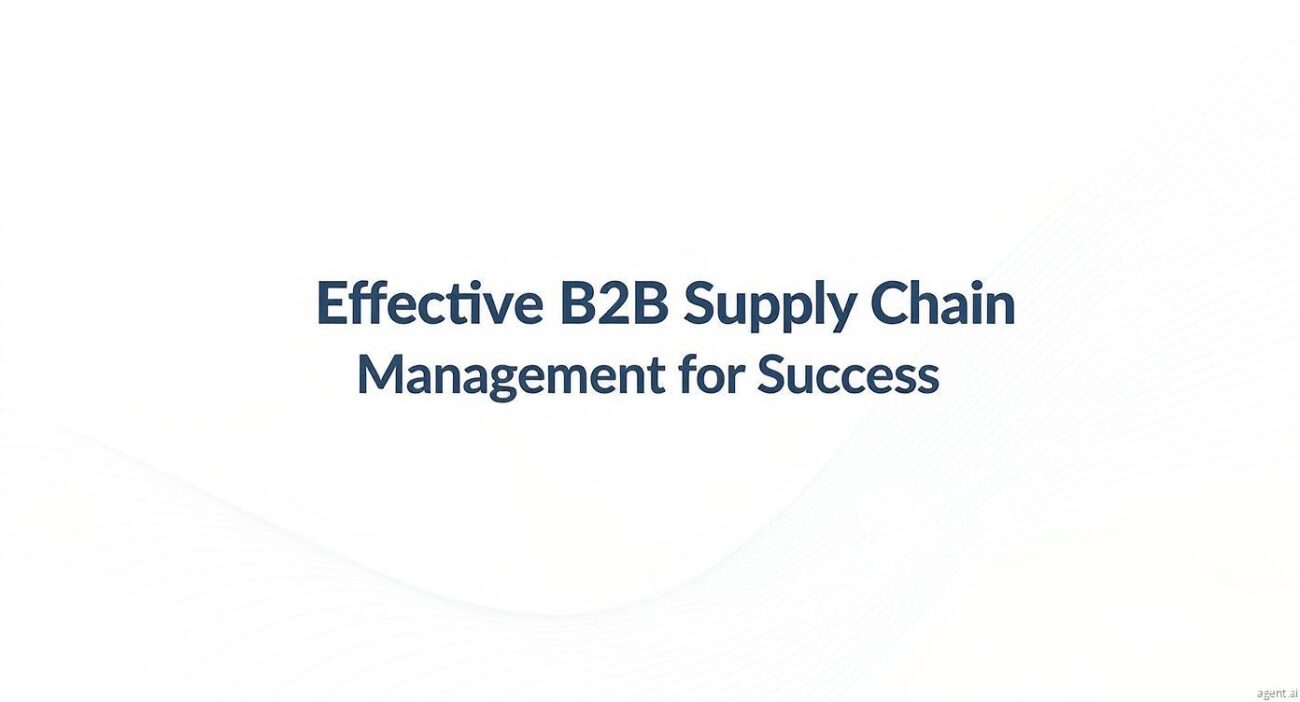Driving Success with Strategic B2B Supply Chain Management
In today’s globalized B2B marketplace, seamless coordination across multiple tiers of suppliers, distributors, and logistics partners is crucial. Organizations that master B2B Supply Chain Management enjoy reduced costs, enhanced customer satisfaction, and competitive agility. For B2B enterprises, supply chains aren’t just about product delivery — they reflect the backbone of operational efficiency.
Understanding the Core of B2B Supply Chain Management
At its essence, B2B supply chain management involves overseeing the flow of goods, data, and finances across organizations. It includes procurement, manufacturing, inventory control, logistics, and demand forecasting. Each of these components must operate harmoniously to deliver value both upstream and downstream.
Unlike B2C supply chains, B2B models deal with bulk purchasing, longer-term contracts, and deeper inter-organizational partnerships. Efficiency in communication and collaboration between partners is vital. Even a minor disruption in a single component can ripple throughout the network, impacting timelines and profit margins.
The Role of Technology in Modern Supply Chains
Digital transformation has reshaped how companies manage their supply chains. Technologies such as AI, machine learning, IoT, and blockchain are integral to modern B2B supply chain management systems. AI can forecast demand more accurately, while IoT enables real-time tracking of inventory and shipments. Blockchain ensures greater transparency and traceability in supplier transactions.
By integrating ERP platforms with supply chain solutions, businesses can create a unified digital ecosystem that automates workflows and enhances decision-making. This streamlining of operations helps identify bottlenecks, reduce lead times, and improve resource allocation across the value chain.
Enhancing Visibility and Transparency Across the Chain
One of the core challenges in B2B supply chain management is achieving end-to-end visibility. Visibility ensures stakeholders can track materials from sourcing to final delivery. It empowers businesses to proactively respond to disruptions and adjust sourcing strategies accordingly.
To gain this visibility, firms must invest in supply chain analytics, cloud platforms, and API integrations that facilitate seamless data sharing. A transparent supply chain boosts trust among partners and enables agile responses to market shifts or demand changes.
Supplier Relationship Management as a Success Lever
Strong supplier relationships are central to effective B2B supply chain management. Reliable suppliers reduce procurement risk and provide consistent quality, which is vital in a competitive B2B landscape. Establishing collaborative relationships fosters innovation, cost savings, and long-term loyalty.
To achieve this, companies should create supplier scorecards, conduct regular reviews, and engage in joint planning initiatives. Contractual clarity, ethical sourcing policies, and mutually beneficial KPIs ensure that both parties remain aligned on performance and strategic objectives.
Sustainability as a Strategic Differentiator
As environmental regulations tighten and customer expectations evolve, sustainability is becoming a critical element in B2B supply chain management. Businesses are being held accountable for the environmental and social practices of their suppliers. Incorporating green procurement, reducing carbon footprints in transportation, and minimizing packaging waste are no longer optional.
Firms can adopt circular supply chain models that promote recycling and reuse. Sustainable supply chain strategies not only reduce environmental impact but also lower long-term costs and enhance brand reputation.
Risk Management and Supply Chain Resilience
Disruptions such as global pandemics, geopolitical conflicts, and natural disasters have underscored the importance of supply chain resilience. For effective B2B supply chain management, risk assessment and contingency planning are vital.
Companies must identify critical suppliers, analyze single-source dependencies, and diversify supplier networks where possible. Creating digital twins of the supply chain helps simulate potential disruptions and test responses before real issues arise. Agile supply chains that can quickly pivot in response to unexpected changes have a significant strategic advantage.
Demand Forecasting and Inventory Optimization
Another key area within B2B supply chain management is demand planning. Accurate forecasting ensures that inventory levels meet demand without excessive stockpiling or shortages. This balance optimizes cash flow and reduces storage costs.
Machine learning algorithms can analyze historical sales data, seasonal trends, and external variables like market shifts or economic indicators. These insights feed into automated inventory systems that adjust purchasing schedules and replenishment frequencies dynamically.
Data-Driven Decision Making for Supply Chain Growth
Data is the lifeblood of modern B2B supply chain management. Real-time access to operational data enables smarter and faster decisions. Advanced analytics provides visibility into supplier performance, shipping delays, procurement cycles, and cost fluctuations.
Dashboards and KPIs allow supply chain managers to benchmark performance and uncover inefficiencies. Businesses that embrace data-driven supply chain strategies can respond to customer needs more effectively and improve profitability through precision and speed.
Building Collaborative Partnerships for Long-Term Growth
Collaboration is a defining factor of success in B2B supply chain management. Instead of transactional relationships, B2B companies are shifting towards integrated partnerships. Joint business planning, shared investments in infrastructure, and synchronized logistics models strengthen the entire value network.
When supply chain partners share a common vision and commitment to efficiency, they are better positioned to innovate and meet market demands. These collaborative models also drive faster go-to-market timelines and improve customer experiences across industries.
Read the Full Blog Now @ https://acceligize.com/featured-blogs/effective-b2b-supply-chain-management-for-success/
About Us
Acceligize is a global B2B demand generation company, specializing in delivering high-quality leads and data-driven marketing solutions for modern businesses. Leveraging AI, content syndication, and targeted outreach strategies, Acceligize empowers B2B organizations to accelerate pipeline growth and increase ROI. As industry leaders in multichannel lead generation, our mission is to help you reach the right audience with the right message at the right time.
